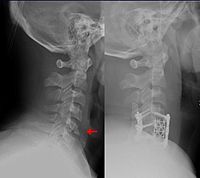
Photo from wikipedia
Study Design. Systematic review and meta-analysis. Objective. To perform a systematic review and meta-analysis to identify if intraoperative or postoperative differences in outcomes exist between orthopedic and neurological spine surgeons.… Click to show full abstract
Study Design. Systematic review and meta-analysis. Objective. To perform a systematic review and meta-analysis to identify if intraoperative or postoperative differences in outcomes exist between orthopedic and neurological spine surgeons. Summary of Background Data. Spine surgeons may become board certified through orthopedic surgery or neurosurgical residency training, and recent literature has compared surgical outcomes between surgeons based on residency training background with conflicting results. Materials and Methods. Using Preferred Reporting Items for Systematic Reviews and Meta-analyses guidelines, a search of PubMed and Scopus databases was conducted and included articles comparing outcomes between orthopedic spine surgeons and neurosurgeons. The Newcastle-Ottawa scale was used to determine the quality of studies. Forest plots were generated using mean differences (MD) for continuous variables and odds ratios (OR) for binomial variables, and 95% CI was reported. Results. Of 615 search term results, 16 studies were identified for inclusion. Evaluation of the studies found no differences in readmission rates [OR, ref: orthopedics: 0.99 (95% CI: 0.901, 1.09); I 2 = 80%], overall complication rates [OR, ref: orthopedics: 1.03 (95% CI: 0.97, 1.10); I 2 = 70%], reoperation rates [OR, ref: orthopedics: 0.91 (95% CI: 0.82, 1.00); I 2 = 86%], or overall length of hospital stay between orthopedic spine surgeons and neurosurgeons [MD: −0.19 days (95% CI: −0.38, 0.00); I 2 = 98%]. However, neurosurgeons ordered a significantly lower rate of postoperative blood transfusions [OR, ref: orthopedics: 0.49 (95% CI: 0.41, 0.57); I 2 = 75%] while orthopedic spine surgeons had shorter operative times [MD: 14.28 minutes, (95% CI: 8.07, 20.49), I 2 = 97%]. Conclusions. Although there is significant data heterogeneity, our meta-analysis found that neurosurgeons and orthopedic spine surgeons have similar readmission, complication, and reoperation rates regardless of the type of spine surgery performed.
Journal Title: Spine
Year Published: 2023
Link to full text (if available)
Share on Social Media: Sign Up to like & get
recommendations!